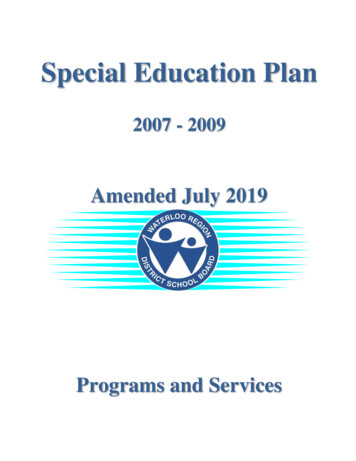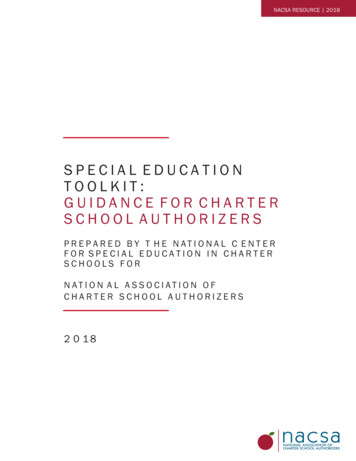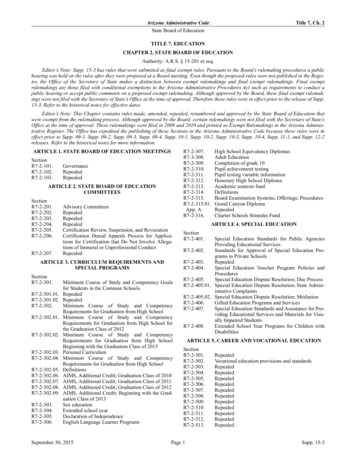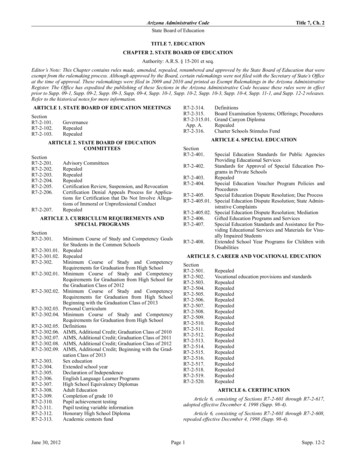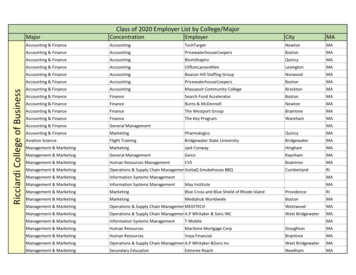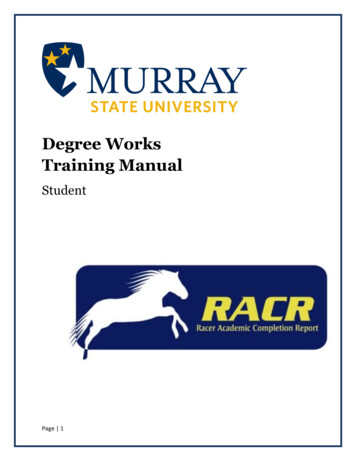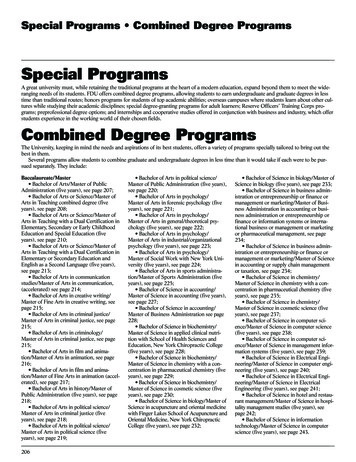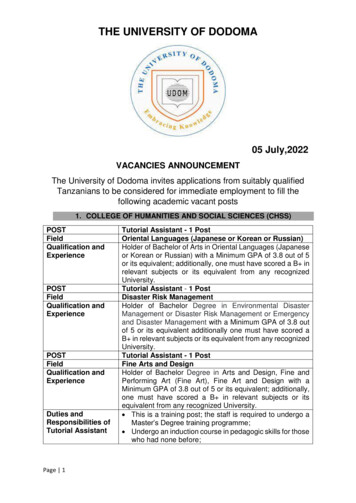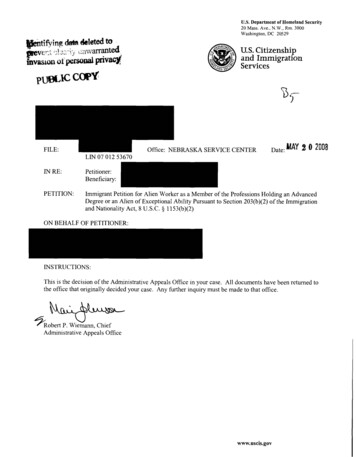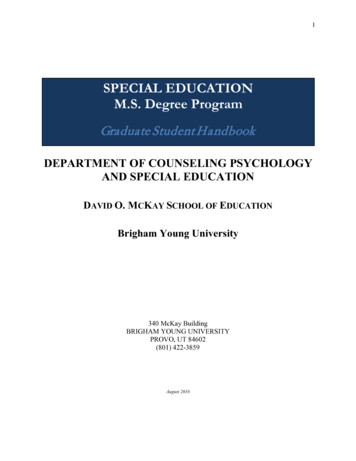
Transcription
1SPECIAL EDUCATIONM.S. Degree ProgramGraduate Student HandbookDEPARTMENT OF COUNSELING PSYCHOLOGYAND SPECIAL EDUCATIONDAVID O. MCKAY SCHOOL OF EDUCATIONBrigham Young University340 McKay BuildingBRIGHAM YOUNG UNIVERSITYPROVO, UT 84602(801) 422-3859August 2016
2About This Handbook . 4Welcome to the Special Education Program . 4David O. McKay School of Education Departments and Programs . 4Registering for Classes . 4ALLIANCE with Office of Graduate Studies . 5University Standards and Policies . 5General Honor Code Statement . 5Continuing Ecclesiastical Endorsement . 5Preventing Discrimination and Sexual Harassment. 5Students with Disabilities Policy . 6Diversity and Unity Policy . 6Financial Support . 6Graduate Mentoring Award (funded by BYU Graduate Studies). 6Graduate Research Assistantships . 6McKay School of Education . 6BYU Special Education Graduate Faculty . 7M.S. in Special Education Program Overview. 7The Mission of the Special Education Program . 7The Purpose of the Master of Science Program . 7Orientation and the Thesis Advisory System . 8Orientation . 8Selection of a Thesis Chair/Advisory Committee . 8Curriculum and Scheduling. 9Cohort Learning . 9Degree Requirements . 9Learning Outcomes . 9Program of Study. 10Graduate Student Progress Reports . 12The Thesis . 12Thesis Overview . 12APA Formatting Help. 13Planning Your Schedule . 13Selecting a Thesis Topic. 13Prospectus Defense. 13Human Rights and the Institutional Review Board (IRB) . 14Thesis Defense and Final Examination . 15Research and Scholarship . 15Academic Policy Items . 15Transfer Credit . 15GPA Requirements . 16Minimum Registration Requirement . 16Progress Toward Graduation . 16Time Limit . 17Leave of Absence . 17Consent for Use of Student Work. 17
3Graduate Student Evaluation . 17Course Grades and Thesis Research . 17End-of-Semester Graduate Student Evaluation . 18Evaluation Domains . 19Graduation Processes . 21Application for Graduation. 21Graduation Deadlines . 21The Exit Interview . 21Graduation Ceremonies . 21Professional Development . 22Dissemination of Research . 22The Council for Exceptional Children . 22Graduate Student Association . 23Grad-to-Grad Mentoring . 23The Brigham Young University - Public School Partnership . 23BYU Fingerprint Background Clearance & Photo ID Policy . 24Description of Facilities . 24Technology Education Computing Lab . 24University Writing Center . 24Statistics Lab . 25Graduate Student Mailboxes . 25APPENDIX. 25Program Forms and Guidelines. 25Student Travel/Registration Authorization Form 2013 . 26End-of-Semester Graduate Student Evaluation . 27Thesis Prospectus Procedures . 28Thesis Prospectus Approval Form. 30Co-authorship Agreement Form for M.S. in Special Education Students . 31M.S. in Special Education Policy on Authorship . 32Scheduling the Thesis Defense . 34Thesis Defense Meeting General Outline. 35Getting Your Thesis Approved . 36Oral Comprehensive Examination Procedures . 37Oral Comprehensive Exam Form . 39Overview of the Cognitive Domain of Bloom’s Taxonomy . 40Consent to Use Student Work. 41Consent Form for Obtaining Data from Future Employer(s) . 42Academic Grievances and Termination of Graduate Status . 43Grievance Procedures . 43Termination of Graduate Status. 43Appeal of Termination . 43Discontinuance . 43
4MASTER OF SCIENCE IN SPECIAL EDUCATIONPROGRAM HANDBOOKAbout This HandbookThis handbook details the policies, procedures, expectations, and resources for graduate students in theSpecial Education (SPED) Master of Science (M.S.) program. This version supersedes and replaces allprevious SPED M.S. program memos, updates, and handbook versions. You will be notified of anychanges in policies and procedures. You are responsible to meet the policies noted in the most recentversion of the handbook.When you were admitted you met the requirements of the program as it was established at the time ofyour admission; however, you have the option of completing the program requirements under whichyou were admitted or choosing the newer set of program requirements—should they change while youare in the program. The contact person for this handbook is the SPED Graduate Coordinator, Dr.Blake Hansen in 340-C McKay Building, BYU, Provo, Utah 84602; (801) 422-4631; email:blake hansen@byu.edu .Welcome to the Special Education ProgramThis program combines research-based teaching with collaborative experiences in courses offeredalongside your peers in related programs (e.g., School Psychology, Teacher Education), thusenhancing knowledge and skills. We are fortunate that a BYU education offers a spiritual, ethical andmoral dimension of education. Our faculty is committed to assisting you as you learn and growprofessionally in the program. We are certain that you will enjoy this experience and find great rewardin hard work and devotion to your studies.David O. McKay School of Education Departments and ProgramsThe David O. McKay School of Education (MSE) is one of eight Schools/Colleges within theuniversity that prepares educators. Our department of Counseling Psychology and Special Education isone of five in the MSE. The other four departments include: Teacher Education, EducationalLeadership and Foundations, Instructional Psychology and Technology, and CommunicationDisorders.Recently the McKay School of Education was nationally ranked at 78 in the U.S. News & World Report(2016 Edition). Rankings are based on expert opinion about program quality and statistical indicatorsthat measure the quality of a school’s faculty, research, and students.Registering for ClassesThe M.S. program is a part-time, evening school program. The minimal University enrollmentstandards include: (1) register for at least two semester hours each semester or term in which you areusing university resources (including consulting with your faculty advisor), and (2) register for aminimum of six semester hours during each academic year. The Graduate Catalog is found -studies-catalog. You can find Graduate andUndergraduate courses at https://registrar.byu.edu/academic-tools.
5ALLIANCE with Office of Graduate StudiesThe Graduate Studies (GS) department works with the department to recruit, admit, and supportstudents through their graduate programs. G.S. also makes sure the University requirements are met.When you are admitted you are assigned a five-digit code—indicating the year and term you wereadmitted. You can refer to their website for information about admissions, program of study, programprogress reports, grade point average requirements, deferrals or leave of absence, credit limits,graduation requirements, etc. See nd-procedures.University Standards and PoliciesGeneral Honor Code StatementBrigham Young University exists to provide a university education in an atmosphere consistent withthe ideals and principles of The Church of Jesus Christ of Latter-day Saints. Specific policiesembodied in the Honor Code include (1) the Academic Honesty Policy, (2) the Dress and GroomingStandards, (3) the Residential Living Standards, and (4) the Continuing Student EcclesiasticalEndorsement Requirement. See the Honor Code website.Continuing Ecclesiastical EndorsementYou are required to have a Continuing Student Ecclesiastical Endorsement for each academic year inwhich you wish to register for any university credit. This includes thesis hours, internships, or offcampus programs. See the Continuing Ecclesiastical Endorsement instructions.If Not LDS. If you are not LDS, you may be endorsed by the local leader of your preferred religiousdenomination or by the bishop of the LDS ward boundaries in which you live.Preventing Discrimination and Sexual HarassmentTitle IX of the Education Amendments of 1972 prohibits sex discrimination against any participant inan educational program or activity that receives federal funds. The act is intended to eliminate sexdiscrimination in education, programs, admissions, activities, and student-to-student sexualharassment. Please see information that defines sexual harassment as inappropriate gender-basedbehavior and recommends actions that you can take to deal with such behavior at the followinglocations: Sexual HarassmentUnlawful Gender Discrimination, Unlawful Sexual Harassment and InappropriateGender- Based Behavior
6Students with Disabilities PolicyBrigham Young University is committed to providing a working and learning atmosphere thatreasonably accommodates qualified persons with disabilities. If you have a disability, please seeUniversity Accessibility Center for information about resources, guidelines, orientation, andtechnology.Diversity and Unity PolicyThe Department of Counseling Psychology and Special Education, the David O. McKay School ofEducation, and Brigham Young University are committed to preparing teacher candidates to serveeffectively in a diverse society and to promote respect for individual differences. To assist you in thispreparation, the Educational Growth and Unity Association was developed. For more informationabout the McKay School’s resources on Diversity and Unity, see Diversity and Unity.Financial SupportGraduate Mentoring Award (funded by BYU Graduate Studies)Graduate Mentoring Awards are designed to provide supplemental funding for graduate students whoare mentored by faculty and, in turn, mentor undergraduate students in research, applied experiences,or teaching. Faculty may apply for these awards on the invitation of college deans. Information isavailable in January of each school year.Graduate Studies. More information about funding can be found at BYU Graduate StudiesFunding. This includes scholarship applications as well as other funding sources.Graduate Research AssistantshipsStudents may apply for research and teaching assistantships through the Department of CounselingPsychology and Special Education.McKay School of EducationSchool of Education Scholarships. The McKay School of Education offers variousscholarships. The application is simple to complete and is generally due in winter semester. Seeinformation about applications for the McKay School of Education Scholarships (due March 31 ofeach year).
7BYU Special Education Graduate FacultyCade Charlton, PhDElizabeth Cutrer, PhDGordon Gibb, PhDBlake D. Hansen, PhDRyan Kellems, PhDChristian Sabey, PhDM.S. in Special Education Program OverviewThe Mission of the Special Education ProgramThe BYU special education faculty developed the following mission statement to guide the specialeducation programs:We maximize the potential of diverse learners with individualized educational needs to elevate theirquality of life. We accomplish this by supporting the mission and aims of a BYU education as weintegrate teaching, research, and service. We specifically:Prepare competent and moral educators who select, implement, and evaluate research-basedeffective teaching practices and appropriate curriculum for learners with special needs.Prepare master special educators who provide leadership in problem solving and collaborativerelationships with professionals and families.Add to the knowledge base of special education and related disciplines through research.Serve and advocate for learners with individualized educational needs and others who supportthem.The Purpose of the Master of Science ProgramThe special education MS program prepares educators to provide collaborative leadership within multitiered systems of support to promote continuous improvement for individuals academically and/orbehaviorally at risk.The program is based upon a scholar-practitioner model of training. Many of the M.S. graduatestudents are currently employed as special educators. The scholar-practitioner model is an integratedapproach to training that acknowledges the interdependence of theory, research, and practice.When you graduate from this program, your preparation and credentials will qualify you academicallyand personally for numerous employment options. Graduates in the past have obtained positions asclinical professors, team leaders in schools-such as behavior consultants, special education districtadministrators, and special educators who use research-based practices in their classrooms. Somegraduates have gone on to complete doctoral programs in educational areas.
8Orientation and the Thesis Advisory SystemOrientationDuring your first term, you will receive an overview of the program, the faculty, the university, andgraduate study in special education. This orientation is an important part of the CPSE 601 course, asyou begin to develop your research topic and begin inviting faculty members to work with you on yourcommittee.For general questions about university procedures and graduation, consult the Office of GraduateStudies. You should review the information for Current Students at the BYU Graduate StudiesWebsite.Selection of a Thesis Chair/Advisory CommitteeThesis Chair/Advisor. Chair selection is mainly on the basis of your stated interest in studying a topicin a faculty member's area of research expertise. Upon your admissions, you were assigned a specialeducation faculty member, who has been approved by the Dean and Graduate Studies as an advisor, toadvise you and serve as your thesis chair. This professor serves as the link between you and theprogram. They convey department and program information and feedback about your evaluations,progress, and (if necessary) remediation of deficiencies in your course of study.The first fall semester of study, you meet with your assigned advisor from the Department ofCounseling Psychology and Special Education to obtain agreement for the professor to serve andprovide support for your research. The selection of a thesis chair is made official by getting theprofessor’s signature (as chair) on the Program of Study. Official assignment of the ThesisChair/Advisory Committee is made when faculty members sign the Program of Study form (also called“study list”).Research/Thesis Committee. The thesis committee’s major role is to guide you through the programand to aid in the selection of courses, and to assist you in the preparation, implementation, andevaluation of your thesis. You are encouraged to visit faculty members, discuss their researchinterests, and determine the availability of faculty to serve on your committee. You must select atleast two other graduate faculty to serve on your advisory committee. Choose these members basedupon their expertise in your area of research and their willingness to serve on your committee. Youmay choose committee members from Special Education and/or other areas (e.g., School Psychology,Educational Leadership, Teacher Education, Communication Disorders), but who have expertise inyour area of study.Approval.All committees must be approved by the graduate coordinator and the department chair. Advisoryassignments are made so that the advisory load is shared equally among faculty members. Typically,the advisor will serve the same graduate student throughout the program. Official assignment of the
9thesis chair/advisory committee is made when faculty members sign the Program of Study form.Return this form to the special education Graduate Secretary.In summary, your advisor and advisory committee may assist you in various aspects of the program asyou:Become oriented to the programRegister for appropriate coursesAssure that all program admission deficiencies or conditional admission requirements are met(e.g., completion of post-baccalaureate licensure)Complete or modify the “Program of Study” formObtain (department or college) financial assistance or a graduate assistantshipPrepare for the oral defense of your thesis research and courseworkPrepare for graduationRequest references or other verification of your work as you search for employmentopportunitiesChanges. Change of advisors after students have become familiar with the faculty’s research interestsmay be possible upon request and with approval of the faculty involved, the graduate coordinator, andthe department chair. If circumstances such as major changes in thesis topic, preference, or facultyavailability arise, you may select a different chair.Curriculum and SchedulingCohort LearningStudents are admitted every year as a cohort of students who work together through the same coreacademic program. Since most courses build on the knowledge and skills developed in previouscourses, you must to take the schedule of courses with your cohort. Courses are taught in the eveningsto accommodate teachers’ schedules during Fall, Winter, and Spring. Summer enrollment is alsorequired.Degree RequirementsA Master’s of Science degree in the Special Education program requires successful completion of 36semester hours of graduate coursework, including 6 hours of thesis work. The 36 semester hours are to becompleted in accordance with the program curriculum. Courses align with the focus of the program.Learning OutcomesThe Special Education M.S. program has five primary learning outcomes. At the conclusion of yourstudies, you will have master-level skills and knowledge in the following areas:The graduate student will demonstrate an in-depth understanding of the principles of behavioranalysis as applied to academic and social behavior.The graduate student will demonstrate an in-depth understanding of teaching and learningacademic content in a multi-tiered system of supports.
10The graduate student will select, apply, and evaluate evidence-based interventions.The graduate student will produce, critique and utilize educational and behavioral research.The graduate student will understand and abide by ethical codes, standards of practice, and lawspertinent to educational and behavioral services.These outcomes will be achieved through successful completion of the program, including the requiredcourses and thesis research. See Special Education M.S. Expected Learning Outcomes.Program of StudyThe program of study is an agreement that will help you fulfill all course requirements. You areresponsible to obtain this form, complete it and submit it to the Graduate Secretary no later than themiddle of Fall Semester (first year of your program). The program of study is submitted to DianeHancock, Graduate Secretary, and reviewed by the Graduate Coordinator for final approval. You cansee it on your Graduate Progress Report at the AIM link on the myBYU website.Changes. The program of study is a carefully considered plan which identifies the student’s major, listsall courses required, and designates the graduate committee. Changes in your program or committeemust be authorized by your committee and the graduate coordinator. If you request any exceptions tothe required course work, you must work with your advisor to submit Form 3b: Request for Program ofStudy Change form for approval by your graduate committee (see the Graduate Studies website).
112016 CohortCounseling Psychology & Special EducationSPECIA
SPECIAL EDUCATION M.S. Degree Program 1 DEPARTMENT OF COUNSELING PSYCHOLOGY AND SPECIAL EDUCATION DAVID O. MCKAY SCHOOL OF EDUCATION Brigham Young University 340 McKay Building BRIGHAM YOUNG UNIVERSITY PROVO, UT 84602 (801) 422-3859 August 2016 SPECIAL EDUCATION M.S. Degree Program Graduate Student Handbook 2
